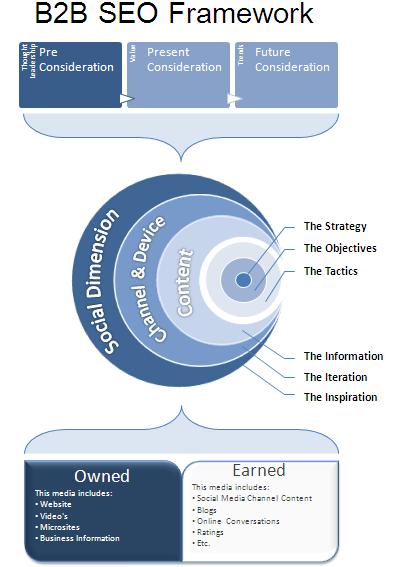The end of the year is always a time for reflection on all of the work and effort of the previous 12 months. There has been a lot of talk in 2011 about the end of SEO as we know it. But the reality is that there will always be a need for strategy when it comes to search engine positioning and capturing audience demand.
Why B2B SEO Strategy Matters
It is true that what represents exceptional SEO work has definitely changed in form and function from even just a few years ago. Many of us can recall the days of sculpting webpages to gain ranking through on-page techniques.
But as we move into 2012 and beyond, quality SEO is about having your marketing assets findable when customers are searching across the dimensions of the pre, present, and future stages of the purchase cycle.
To achieve this, B2B marketers need to have a solid SEO strategy. And while it will vary from company to company based on goals and objectives, in general, it should be grounded in relevance, and be designed to persevere through the ever changing SERP landscape in 2012 and beyond.
Establishing A B2B SEO Relevance Strategy
The manner and approach of being relevant to your customer will vary based on your business goals.
For example, in some cases it’s based on a thorough comparison of possible service vendors and in others, it’s about being top of mind through thought leadership. No matter the ultimate customer path, SEO remains the practice of being found and selected in algorithmic results when a search is underway.
In the era of universal search, the search engines have expanded the galaxy of assets that can be rendered in the SERPs to include videos, images and PDF among others. Add to this the fulcrum of recency and geo location and what you get is a dynamic marketplace where only the most advanced approaches will succeed.
With this in mind, your B2B SEO campaign will need to focus on consideration during the customer journey and the approaches that will generate results in the current SEO environment.
The art and science of getting these assets found remains important, but increasingly the strategy will need to also focus on the information, the iteration, and the inspiration to win in the evolving channel called SEO.
The Information: Your Current Future Content Strategy
At the core of what we as B2B marketers promise in organic results is relevant content to answer the intent of a query.
When we do this well, we are rewarded with greater rankings and increased traffic by the search engines. But it is important to remember that what customers are all looking for when a search is performed is information. In some form or fashion, we type keywords and find the information/content to answer our query.
In order to be found and rendered in the SERPs moving forward the value, relevance, and timeliness of your content is of paramount importance. Â This is becoming even more critical as Google rolls out important updates to its algorithm to ensure that fresh content is being served.
As a B2B marketer, thinking about how to position the right information to the right audience is mission critical in order to succeed in SEO moving forward.

The Iteration: The Device That Renders The Information
We are living in an era where the device is just as critical as search query fulfillment.
How so? People are constantly connected to the Web via their desktops, laptops, smartphones, e-Readers, or tablets.
In order to reach them, marketers need to factor-in these different computing formats as they pertain to SEO. An effective B2B SEO strategy will ensure that information is properly served on each of these types of devices.
In 2012, it will be particularly important to adjust SEO efforts to accommodate tablet devices as they become more and more ubiquitous. I have seen them springing-up more and more at every business meeting; Â it will only be a matter of time until tablet optimization is a best practice.
Until then, there is a market opportunity to gain share through optimizing and serving relevant content based on the device experience and user demographics.
The Inspiration: The Ability Of The Message To Create Social Input
Once we have created the right content, rendered it successfully across channels and devices, we need to ensure that our information is worthy of being shared.
Developing quality content is the most certain way to achieve this; however in a competitive arena, the advantage goes to those whose message inspires and compels people to share.
But I’m not talking about “wonder of the moment†spectacles that exist to provide short term boosts. Rather, I’m talking about the share-ability of a message and the ability of that message to foster future interaction.
As SEO evolves, share-ability and other social signals will be a major factor in how the search engines calculate relevance. Not only can it be scored methodologically in an algorithm, but more importantly, it also represents market demand.
B2B marketers should strive to develop information that is findable and able to inspire a like, a +1, a comment, or some other tip of the hat that says, yes, this is the type of information that I am interested in consuming.
As we approach another year in our ever changing search realm, think of how your campaign can provide information to your customers, be iterated to them when and where they in market, and inspire them to action and social sharing.
Opinions expressed in the article are those of the guest author and not necessarily Search Engine Land.
Related Topics: B2B Search Marketing
Article source: http://searchengineland.com/preparing-for-a-new-era-of-b2b-seo-105261
